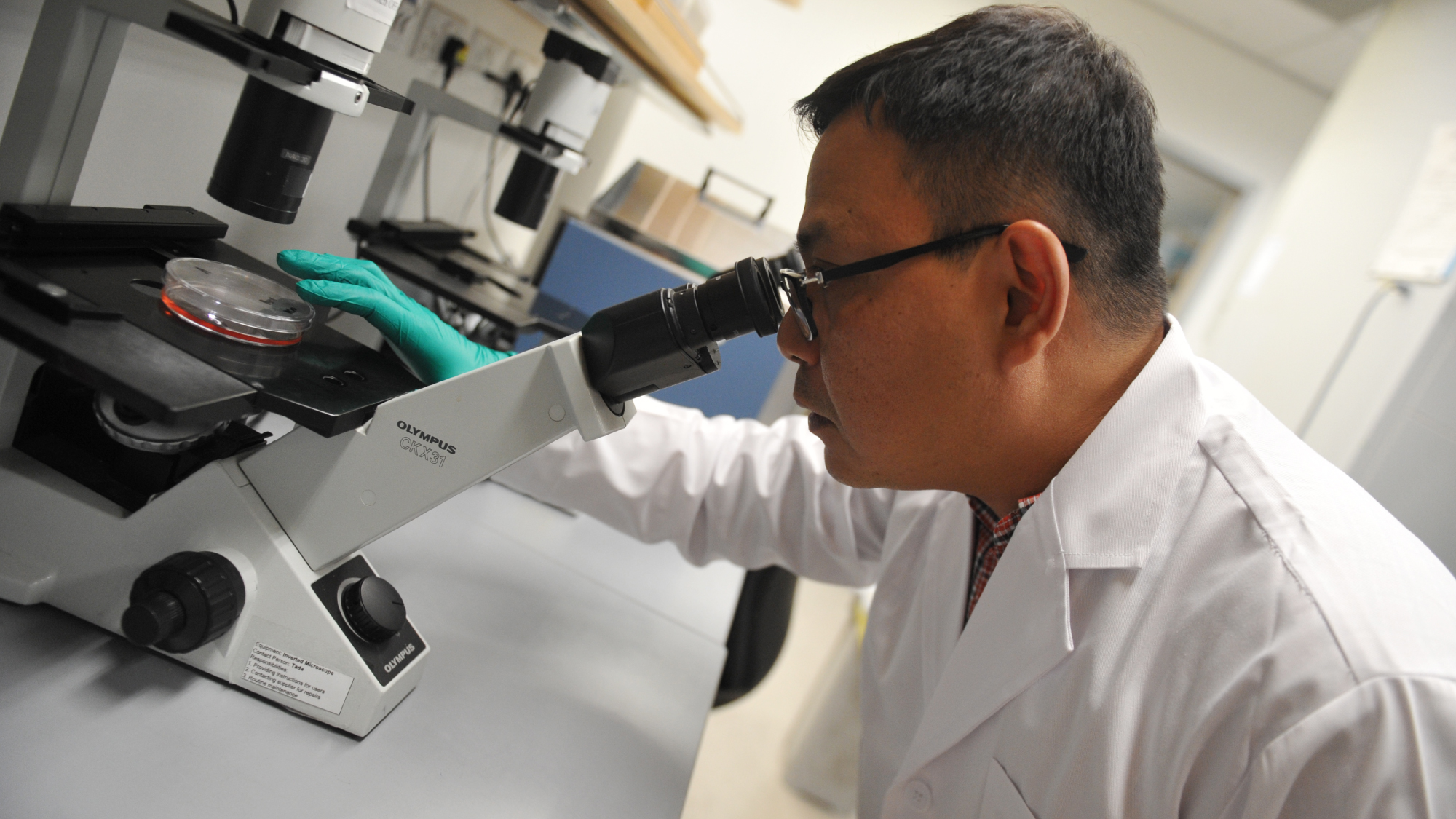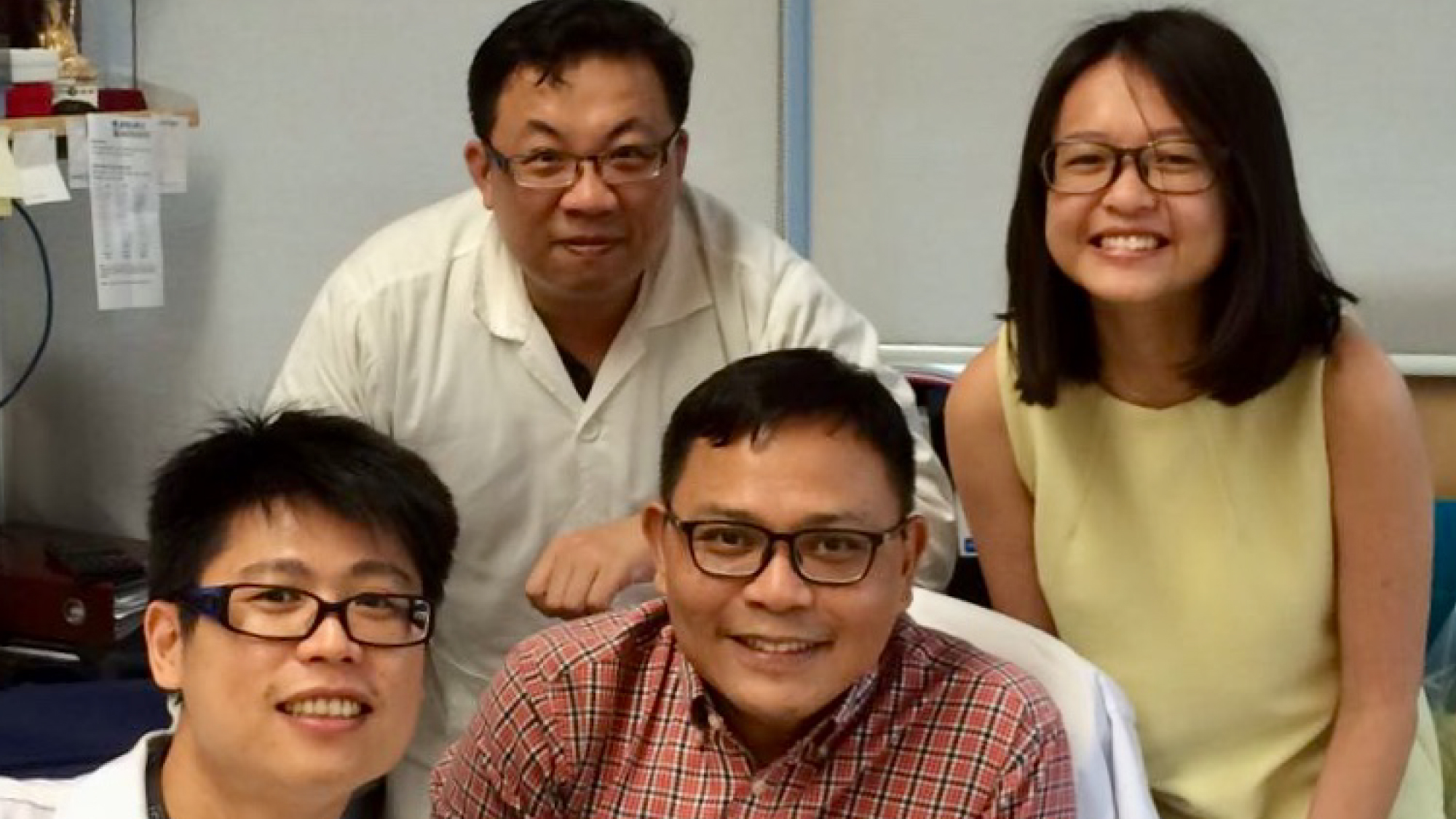Succumbing to Biotechnology’s Adrenaline Rush
By Dr Azhar Ali, Senior Research Scientist,
Cancer Science Institute, Singapore
I never imagined that I would be a scientist. I was born into a working class family and was raised, together with my four older siblings, in the eastern part of Singapore. My dad worked in the military and was a strict disciplinarian. He emphasized the importance of education and getting good examination results. Getting low marks, for any subject, meant punishment in the form of the ‘rotan’ (Malay word for the wooden cane). My dad, it seemed to me back then, was “allergic” to red marks in my school report card. School was not fun for me in the early years. I would always look forward to the end of a school day, and especially the long June and December school holidays. Though I did not do badly throughout my primary and secondary school phases, my family and teachers kept telling me that I could have done better. I did not truly comprehend this until I was called up for national service in 1990. I went through the three-month Basic Military Training and then the Combat Medical Orderly course to be a Medic. After getting to know my army mates, I realised that most had their dreams planned – some were going to pursue medical, engineering, finance and law degrees among others. It was at this moment that I questioned myself about my own future. Coming from a pure Science (Chemistry and Physics) background, I realised that I was interested in Biology – what defines a living thing? I was initially worried about my lack of knowledge in Biology. On one fateful day, I came across an article about the emerging field of Biotechnology that was published in the Straits Times. This was an emerging new field, which was recognised as one of the four pillars of Singapore’s future economy. Reading the article prompted me to find out more about the area of Biotechnology. After some research, I decided to enroll in the Diploma in Biotechnology programme offered by Singapore Polytechnic after I completed my National Service. This did not really go down well with my dad, who thought I was taking a step backward with this decision. For me, the most important factor to consider was that I had no prior Biology exposure, and that this was a good first step towards learning Biology.
Biomedical research
Polytechnic education was hectic and I really enjoyed the emphasis on practical sessions despite the long school hours. During the Industrial Attachment Programme, my classmates and I were assigned to various research laboratories in the Department of Biochemistry at the National University of Singapore. The industrial attachment was exciting and it provided the opportunity to learn from scientists – and this was where my journey in biomedical research began. DNA, RNA and proteins are the essence of any living cell and organism. The intricate balance of highly complex processes is crucial in determining the life and death of an entity. This whole new world of biomedical research was an adrenaline rush, one which I had never felt or experienced before. Personal encounters with friends and relatives, who were diagnosed with diseases such as cancer, led to my resolution to pursue undergraduate studies at the Queensland University of Technology in Brisbane, Australia with the support of the Singapore Millenium Foundation (under Temasek Holdings Pte Ltd) in the form of a scholarship, I eventually did my PhD programme in Molecular Genetics at the Yong Loo Lin School of Medicine, National University of Singapore (NUS).
Drug repurposing
My journey into lung cancer research started when I joined Dr Matiullah Khan’s group at the Oncology Research Institute, NUS (now known as Cancer Science Institute of Singapore or CSI Singapore) as a postdoctoral fellow. The dismal prognosis of lung cancer patients, due to limited effective therapeutic options and the development of resistance to drugs, spurred me into lung cancer research, in the hope of finding a way to help these patients. Despite the extensive number of research groups working on lung cancer, the survival rates remain low for lung cancer patients. The main issues of lung cancer treatment are – 1) the high failure rates of clinical trials, 2) the development of resistance to drugs, and 3) the long time and large sums of money (about 14 years at a cost of US$2-3 billion dollars) to get a new drug onto the market. It is therefore important to use an approach to improve success of treatment, and reduce both time and costs.

Dr Ali at work in the research lab.
One such approach is drug re-purposing, which looks at whether drugs that have been approved for the treatment of certain diseases can also be used to treat other diseases. As the formulation, potential toxicities and pharmacology of these drugs have been established, the process of integration of new candidate therapies into healthcare can be considerably shortened. An example is asprin: originally developed as a pain reliever for minor aches and fever, it is also used today as an anti-inflammatory drug and a blood thinner and is given to patients immediately after a heart attack to prevent further clot formation and cardiac tissue death.
Hard work, mentors and luck
Juggling reading papers, planning, carrying out experiments, writing manuscripts and reports are part of a postdoctoral fellow’s life. You need to come up with your own hypotheses and then prove them. You think of science every day, hour and minute literally. You are constantly trying to find ways to prove that your hypothesis is correct or trying to figure out what went wrong with the experiment. Despite the hectic days at work, I really enjoy and relish these challenges. My dream of pursuing drug re-purposing took a step forward when I accepted the post of Senior Research Fellow at CSI Singapore under the Lung Cancer group. Together with Dr Chin Tan Min, a lung oncologist, and Prof Daniel Tenen, Director of CSI Singapore as mentors, my maiden research project on tackling chemo-resistance in lung cancer through drug re-purposing took off. Having good mentors to discuss ideas and test one’s scientific thinking is extremely important. The unwavering support and guidance from Tan Min and Dan gave me the opportunity to progress. Most scientists today face great difficulty in getting funding for their research. Opportunities to secure grant money is limited and the rise in prices of consumables has made it difficult to do good research. Fortunately, despite limited available funding, the project moved nicely along for several years.
This was achieved through careful planning and focusing on important experiments. The ‘lucky break’ came in 2017 when I received a three–year funding grant from a private donor, Ms Lee Ying. This funding was extremely crucial as it provided much needed ‘fuel’ to push the project further.
Setting personal goals
What is life? There is no single definition – each individual has his/her own personal life goals. Someone once asked me, “ What are your goals in life?” When I set my personal goals at around the age of 19, I emphasised setting realistic goals – goals that I could achieve in this lifetime. My goals are – 1) Do what you love, 2) Contribute beyond yourself, 3) Resolve to succeed and 4) Positive attitude. Setting life goals and achieving them not only improve your life, but also makes you a happier person. Our life goals are the destinations that we need to reach – some may take a longer time to get there, while some may take a shorter time.
Whatever it is, it is important to be mindful that with each goal, comes its own set of challenges that we need to overcome. Some may be easier while others are more difficult to tackle. Nonetheless, one must never give up and focus on the destination that one wants to reach. As we continue with our journey, family, friends and even strangers may enter our lives – each contributing in their own unique ways, leaving their imprints in our lives. We must never take things for granted nor forget those who have helped us as we tread towards our goals. We must live with gratitude and pay forward that which we have received in this life. I would like to express my deepest gratitude to my family, friends, colleagues, mentors and Ms Lee for their support, without which this journey would not have been possible.

Dr Ali with colleagues.
